Now Reading: BMW upgrades R&D for new era of self-driving cars
-
01
BMW upgrades R&D for new era of self-driving cars
BMW upgrades R&D for new era of self-driving cars

BMW is revamping its research and advancement activities to concentrate on self-driving vehicles, board member Klaus Froehlich told Reuters, a relocation that includes a revamp of its “i” sub-brand of carbon-fibre based electric vehicles.
The business is updating its zero-emission vehicles after a lackluster reaction to its only fully battery-powered automobile, the i3, which had only 25,000 sales last year. While Tesla currently has over 370,000 orders for its Model 3.
To improve sales, BMW is increasing the battery variety of its i3 city car by 50 percent this year.
Its next full-fledged new electric automobile model is not due till 2021, however the Bavarian auto maker is likewise planning to develop a new variation of its i3 electrical vehicle to be launched by 2018.
“It is a sportier sibling for the i3,” stated the source, who refused to be named.
Rivaling Tesla is due to release its Model 3 in 2017, and as rivals Porsche and Audi are dealing with all-electric vehicles for release by 2019.
A brand-new BMW flagship design with autonomous driving abilities will follow in 2021. As an outcome, Froehlich is increasing the percentage of software and technology professionals.
At present, software engineers make up simply 20 percent of the 30,000 staff members, specialists and providers that deal with research and advancement for BMW. Within the next five years, BMW desires to raise that proportion to 50 percent of general R&D personnel.
In an interview at the automaker’s head office in Munich, BMW board member Klaus Froehlich, who is in charge of advancement, stated he restructured company-wide research and development in April.
” It is now in ramp-up stage. We call it Project’ i Next’.”
As part of its push in self-driving, BMW is employing specialists in machine learning and expert system. It is also incorporating the functions of existing computer-driven help systems like cruise control, emergency braking, lane-keeping assistance and automatic parking.
Stay Informed With the Latest & Most Important News
Previous Post
Next Post
-
 01Polestar Boss Says It’s Time To Outrun BMW M And Mercedes-AMG
01Polestar Boss Says It’s Time To Outrun BMW M And Mercedes-AMG -
 02Spy Shots: 2027 Mitsubishi Pajero Spotted in Testing Ahead of Possible U.S. Return
02Spy Shots: 2027 Mitsubishi Pajero Spotted in Testing Ahead of Possible U.S. Return -
 03Spy Photos: VW ID. Polo GTI Goes Electric with 223 HP and 280 Miles of Range
03Spy Photos: VW ID. Polo GTI Goes Electric with 223 HP and 280 Miles of Range -
 04The Controversial Ford Voodoo V8 That Was Killed Off Too Early
04The Controversial Ford Voodoo V8 That Was Killed Off Too Early -
 052026 Toyota Hilux EV: A Powerful Truck with Silent Torque
052026 Toyota Hilux EV: A Powerful Truck with Silent Torque -
![2027 Mercedes-Benz S-Class Debuts with V8 Engine [Photo Gallery]](https://speedlux.com/wp-content/uploads/2026/01/2027-Mercedes-Benz-S-Class-33-155x125.jpg) 062027 Mercedes-Benz S-Class Debuts with V8 Engine [Photo Gallery]
062027 Mercedes-Benz S-Class Debuts with V8 Engine [Photo Gallery] -
 07Hyundai Palisade’s Breakout Year Shows How Quickly the Market Can Turn
07Hyundai Palisade’s Breakout Year Shows How Quickly the Market Can Turn


![2027 Mercedes-Benz S-Class Debuts with V8 Engine [Photo Gallery]](https://speedlux.com/wp-content/uploads/2026/01/2027-Mercedes-Benz-S-Class-33-700x394.jpg)










































